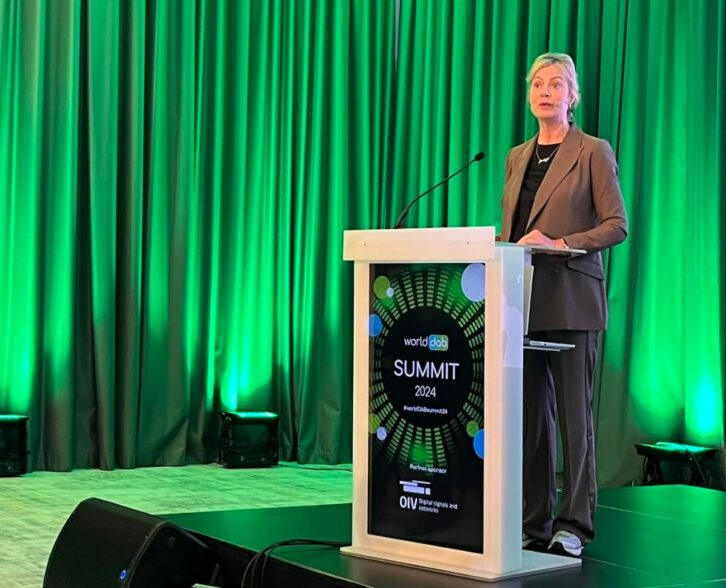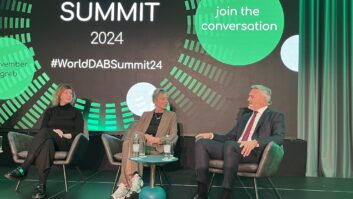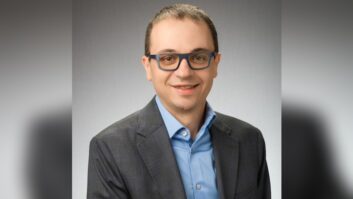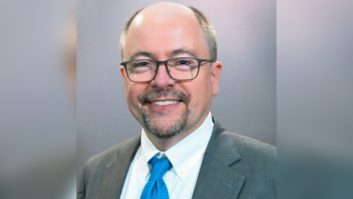DAB+ is making significant progress worldwide. That was the message delivered by WorldDAB President Jacqueline Bierhorst at the opening of the one-day WorldDAB Summit 2024 in Zagreb, Croatia, on Nov. 14. WorldDAB is the industry group spearheading the deployment of the DAB+ digital radio standard worldwide.
Bierhorst started opening comments by applauding the successful German testing of the WorldDAB/Digitalradio Deutschland Automatic Safety Alert (ASA) system. ASA is designed to deliver reliable safety alerts to the public without requiring an internet connection. “This will save lives,” she said. “With the recent terrible floods in Spain and elsewhere, we have seen how urgent and necessary this development is. It is forward looking — the biggest update to DAB standards for many years.”
Next, Bierhorst did a rundown on DAB+’s rollout status around the globe. She included “new markets such as Spain, where DAB+ is now on air in 13 Spanish cities,” and “rapidly growing markets such as France, with now over 60% coverage of the mainland.” Meanwhile, in established markets such as the UK, “the latest audience research shows DAB now taking nearly two-thirds of in-car listening, and the biggest commercial networks are launching many new digital brand extensions, alongside the rollout of dozens of new smaller multiplexes,” said Bierhorst.

In Africa, “we’re delighted that Ghana is now moving from trials to advertise a license for its first permanent DAB+ multiplex,” she told the WorldDAB Summit 2024 audience. “In June, Senegal launched its DAB+ pilot, with 32 stations broadcasting across two multiplexes from Dakar, and there’s a pilot project in Uganda, covering Greater Kampala, with interest from several private network operators. We are also seeing great interest from the Southern Africa Development Community, and their Communications Regulator Authority of Southern Africa (CRASA), who we’re working with on a series of webinars and reports, which will lead to a roadmap for approval by the SADC General Assembly next March.”
In the Middle East, the Saudi Broadcasting Authority has installed new DAB+ transmitters in key cities and extended coverage along the Riyadh to Abha highway. “They join Kuwait, Qatar and Tunisia already on air,” said Bierhorst. “Across Asia Pacific, we were recently in Indonesia where DAB+ has been officially adopted. We’re delighted that the regulator in Thailand — NBTC — published a report on the successful DAB+ trial, and is now consulting on a frequency plan and specifications for transmitters and receivers. And in Australia, the market is well-established. ABC and SBS launched DAB+ coverage on the Gold Coast in May, and audiences are growing — including amongst younger listeners.”
Looking ahead to the next 12 months for DAB, “we’ll see ASA receivers reaching the market,” Bierhorst said. “In Switzerland, the public service broadcaster SRG SSR will switch off its FM transmitters at the end of next month to save money on transmission. In the German state of Schleswig-Holstein private and public radio stations have agreed with the state government and the state media authority to gradually switch to digital by 2031.”
[Related: “Swiss Public Radio Commits to 2024 End for FM“]
All of this DAB+ progress is coming at a time when the world is facing increasing political turmoil. This is why “securing radio’s digital future is critical and fundamental for listeners, for broadcasters and for society,” said Bierhorst. “Working together, we can send one message to anyone and everyone around the world who needs to hear it. Broadcast radio must endure. For automakers, radio must remain prominent. We make no apologies for repeating this message, loud and proud.”
“It remains our mission to position DAB+ as the free-to-air broadcast backbone for radio’s digital future,” she concluded. “And we hope that after today, you too will be echoing this when you get home. That way, we can and will maintain this momentum, as we move into 2025 and beyond.”







